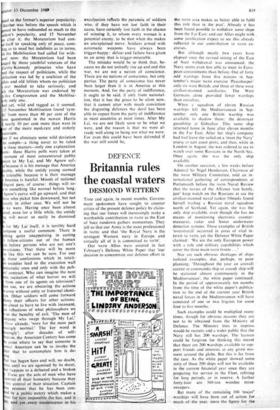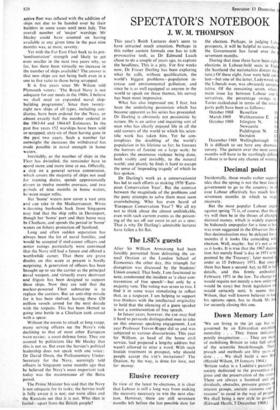DEFENCE
Britannia rules the coastal waters
DESMOND WETTERN
Time and again, in recent months, Govern- ment spokesmen have sought to counter critics of the present defence policy by claim- ing that our forces will increasingly make a worthwhile contribution to NATO as the East of Suez rundown gathers momentum. They tell us that our Army is the most professional in NATO; and that 'the Royal Navy is the strongest Western navy in Europe and virtually all of it is committed to NATO'.
Our NATO Allies were assured in last February's Defence White Paper that 'our decision to concentrate our defence effort in the NATO area makes us better able to fulfil this role than in the past'. Already it has been found possible to withdraw some ships from the Far East; and our Allies might with some justification expect to see this already reflected in our contribution to NATO ex- ercises.
But although nearly two years have elapsed since the revised timing of the East of Suez withdrawal was announced, the Navy seems even less able to meet its Euro- pean commitments than before. Out of forty odd warships from five nations in Sep- tember's major NATO exercise 'Peacekeeper' only six were British, and three of these were civilian-manned auxiliaries. The West Germans alone provided fewer warships than ourselves.
When a squadron of eleven Russian warships left the Mediterranean in Sep- tember only one British warship was available to shadow them: the destroyer guardship at Gibraltar. This same ship returned home in June after eleven months in the Far East. After her ship's company had had leave she sailed on a 'meet the Navy' cruise to east coast ports, and then, while in London in August. she was ordered to sea to watch over some Russians in the North Sea. Once again, she was the only ship available.
On another occasion, a few weeks before Admiral Sir Nigel Henderson, Chairman of the NATO Military Committee, told an in- ternational gathering of correspondents at Portsmouth before the NATO Naval Review that the navies of the Alliance 'can barely. just' keep watch on the Russians at sea the civilian-manned naval tanker Olmcda found herself trailing a Russian naval squadron north of Scotland. Yet again, she was the only ship available, even though she has no means of monitoring electronic counter- measures, radar and Sonar underwater detection systems. These examples of British `overstretch' occurred in areas of vital in- terest to NATO, yet the Defence White Paper claimed: 'We are the only European power with a role and military capabilities which cover the three main NATO fronts ...'
Nor are such obvious shortages of ships isolated examples, due, perhaps, to poor planning. 'Throughout the year an aircraft carrier or commando ship or assault ship will be stationed almost continuously in the Mediterranean', the white paper continued. In the period of approximately ten months from the time of the white paper's publica- tion to the end of the current year British naval forces in the Mediterranean will have consisted of one or two frigates for some four to five months.
Such examples could be multiplied many times, though for obvious reasons they are not to be obtained from the Ministry of Defence. The Ministry tries to impress would-be recruits and a wider public that the Navy still has 200 warships. The layman could be forgiven for thinking this meant that there are 200 warships available to sup- port friends and interests at any given mo- ment around the globe. But this is far from the case. As the white paper showed some sixty of these 200 ships will not be available in the current financial year since they are preparing for service in the Fleet, refitting for long periods, or in reserve. A further forty-four are 360-ton wooden mine- sweepers. But many of the remaining 100 `major' warships will have been out of action for much of the year. sinceithe,figure fec the- active fleet was inflated with the addition of ships not due to be handed over by their builders in some cases until next July. The overall number of 'major' warships Mr Healey could have counted on having available at any given time in the past nine months was, at most, seventy.
Yet with the Far East Fleet back to its pre- 'confrontation' strength and likely to get even smaller in the next two years why, so far, has there been virtually no increase in the number of ships available? The answer is that new ships are not being built even in a one to five ratio to those being scrapped.
It is five years since Mr Wilson told Plymouth voters: The Royal Navy is not adequate for our needs in the 1960s. I believe we shall need an expanded naval ship- building programme'. Since then twenty- eight new ships of all types, including aux- iliaries, have been ordered for the Navy, or almost exactly half the number ordered in the 1963-64 and 1964-65 Estimates. In the past five years 152 warships have been sold or scrapped, sixty-six of them having gone in the past two years. Such a number far outweighs the increases the withdrawal has made possible in naval strength in home waters.
Inevitably, as the number of ships in the Fleet has dwindled, the remainder have to wend more and more time at sea. Officially, a ship on a general service commission, which covers the majority of ships not used for training duties, spends approximately eleven to twelve months overseas, and two periods of nine months in home waters, between major refits.
But 'home' waters now cover a vast area and can take in the Mediterranean. Wives wzIcorning husbands back from Singapore may find that the ship refits in Devonport, though her `home' port and their home may be Chatham, and spends the period in `home' waters on fishery protection off Scotland.
Long and often sudden separation has always been the lot of naval families, and would be accepted if mid-career officers and senior ratings particularly were convinced that the Navy still had a future and offered a worthwhile career. That there are grave doubts on this score at present is hardly surprising. A generation of officers has been brought up to see the carrier as the principal naval weapon, and virtually every destroyer and frigate has been designed to support these ships. ,Now they are told that the nuclear-powered Fleet submarine is to replace the carriers. But an anti-ship missile for it has been shelved, leaving these £20 million vessels armed for the next decade with the torpedo. This has been likened to going into battle in a Chieftain _tank armed with a spear.
Without the means to attack at long range, many serving officers see the Navy's role declining to that of most other European NATO navies: a coast defence force. They are assured by politicians like Mr Healey that this is not so. But even the Service's political leadership does not speak with one voice: Dr David Owen, the Parliamentary Under- Secretary for the Navy, seemingly told officers in Singapore some months ago that he believed the Navy's most important task today was the maintenance of the Beira patrol.
The Prime Minister has said that the Navy is not adequate for its tasks; the Service itself is fully aware it is not; our NATO allies and the Russians see that it is not. Who then is fooled—apart from the British people?















































 Previous page
Previous page